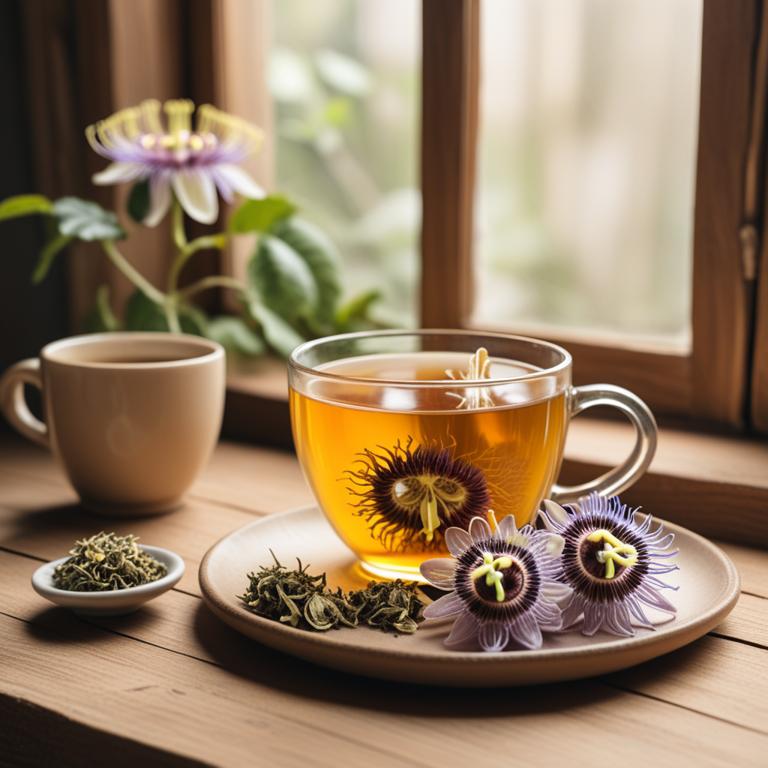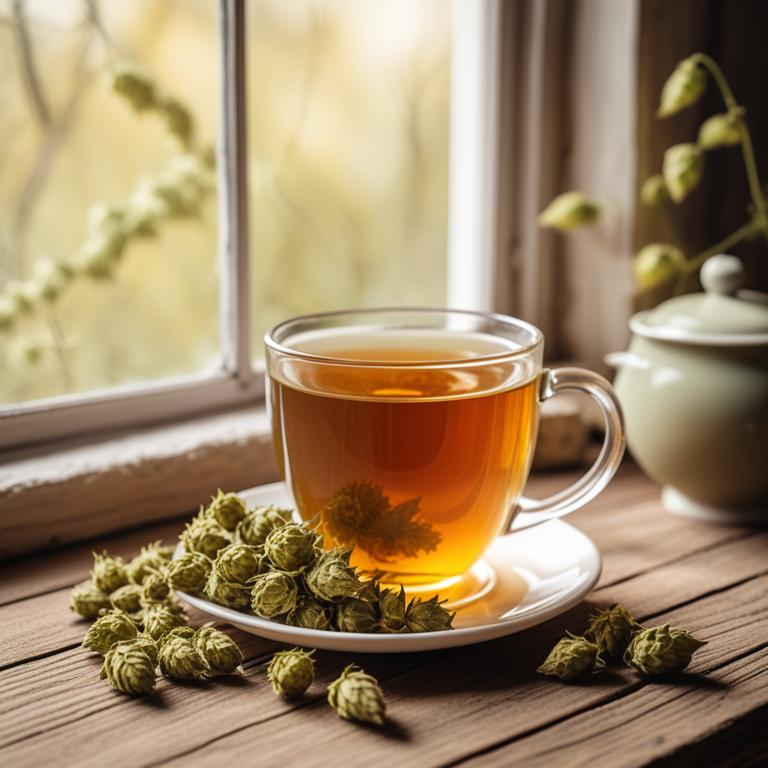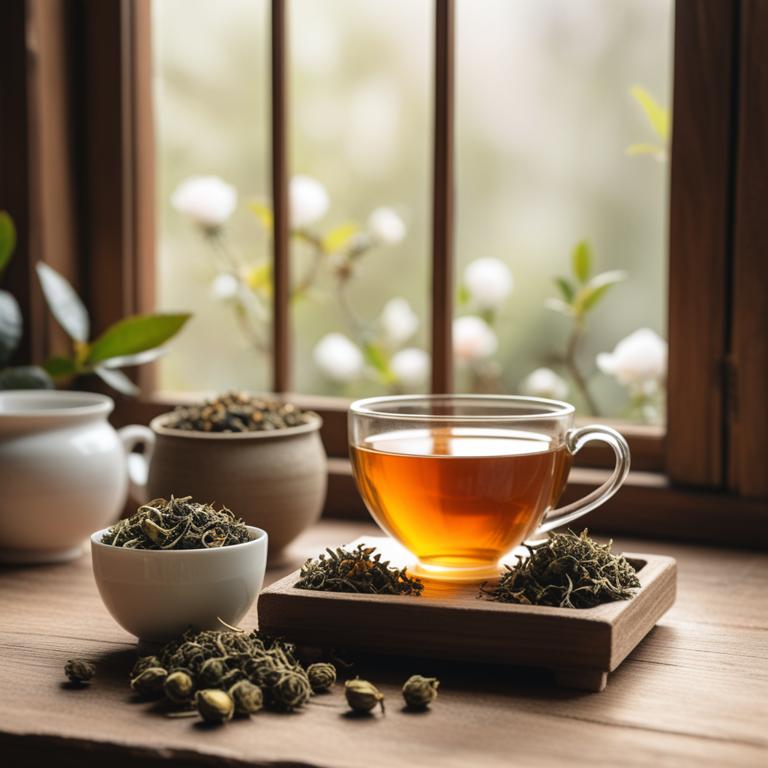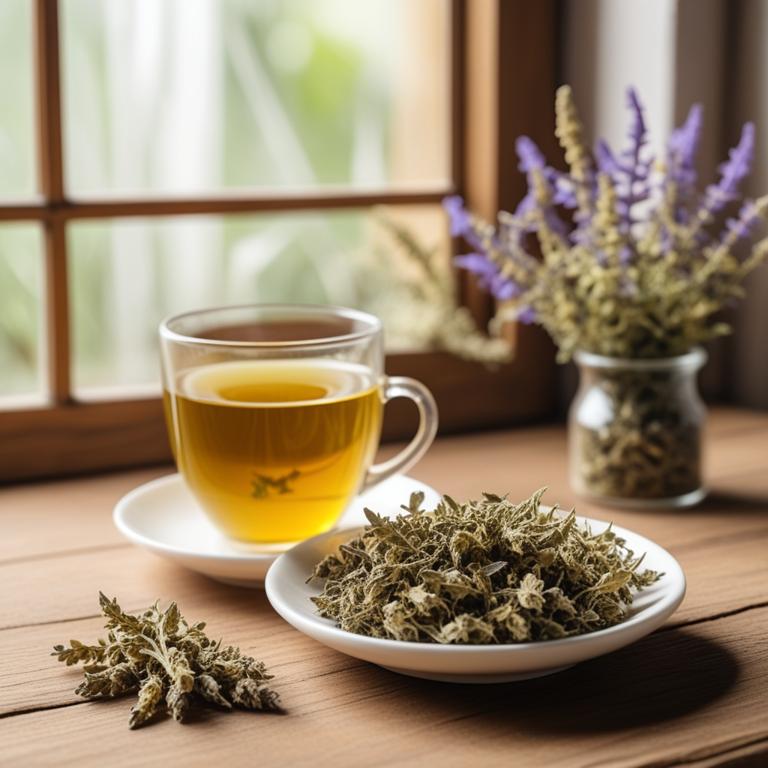11 Herbal Teas For Insomnia

Herbal teas have been used for centuries to help people sleep better.
One reason they're effective is that they can calm the mind and body, making it easier to fall asleep. Valeriana officinalis, also known as valerian root, is a popular herb for insomnia. It contains compounds that slow down brain activity, helping you relax and fall into a deeper sleep. Another herb often used to treat insomnia is Passiflora incarnata, also known as passionflower. This herb has a calming effect on the nervous system, reducing anxiety and stress that can keep you awake at night. It's also known to help regulate your sleep-wake cycle. Lavandula angustifolia, or lavender, is a well-known herb for its calming effects.
Its fragrance can help soothe your mind and body, making it easier to fall asleep. Drinking lavender tea before bed can also promote a restful night's sleep and improve the quality of your sleep. Drinking herbal teas for insomnia can bring many benefits to your life. For one, it can help you get a good night's sleep, which is essential for physical and mental health. When you're well-rested, you'll feel more energized and focused during the day. You'll also be less likely to experience mood swings, irritability, and other negative effects of sleep deprivation. Additionally, using herbal teas for insomnia can be a natural and gentle way to address sleep problems. Unlike prescription medications, herbal teas don't have harsh side effects or interact with other medications.
This makes them a great alternative for people who want to avoid chemicals or have sensitive stomachs.
- 1. Valeriana officinalis
- 2. Passiflora incarnata
- 3. Lavandula angustifolia
- 4. Melissa officinalis
- 5. Avena sativa
- 6. Zingiber officinale
- 7. Humulus lupulus
- 8. Camellia sinensis
- 9. Ginkgo biloba
- 10. Scutellaria baicalensis
- 11. Glycyrrhiza glabra
1. Valeriana officinalis

Valeriana officinalis teas contains valerenic acid, isovaleric acid, and valeranone, which are the main biologically active constituents responsible for its therapeutic effects.
These compounds interact with the brain's GABA receptors, which helps to regulate sleep patterns and reduce anxiety levels. By enhancing the activity of GABA, a neurotransmitter that promotes relaxation, Valeriana officinalis teas helps to calm the nervous system, making it easier to fall asleep and stay asleep. The tea also has a sedative effect, which helps to reduce restlessness and promote deep sleep.
By regulating the body's sleep-wake cycle, Valeriana officinalis teas can help individuals with insomnia to establish a consistent sleep pattern.
- Gather 1 cup of fresh Valeriana officinalis roots or 2 tablespoons of dried roots.
- Measure 1 cup of boiling water and pour it over the roots in a heat-resistant cup.
- Steep the roots for 5-10 minutes, or until the liquid has cooled slightly.
- Strain the liquid into another cup using a fine-mesh sieve or cheesecloth to remove the roots.
- Drink the tea 30 minutes to 1 hour before bedtime to help with insomnia.
2. Passiflora incarnata

Passiflora incarnata teas contains flavonoids, alkaloids, and glycosides as its bioactive constituents.
These compounds help to increase the production of neurotransmitters like serotonin and GABA, which are involved in regulating sleep-wake cycles. The flavonoids in Passiflora incarnata teas also have a sedative effect, which can help to calm the mind and body before sleep. Additionally, the tea's alkaloids, such as harmine and harmaline, have been shown to have a sedative effect and can help to reduce anxiety and stress.
By promoting relaxation and reducing anxiety, Passiflora incarnata teas can help to improve the quality of sleep and alleviate insomnia symptoms.
- Gather 1 cup of fresh or dried Passiflora incarnata leaves.
- Heat 1 cup of water in a pot and bring it to a boil.
- Add 1-2 tablespoons of the Passiflora leaves to the boiling water.
- Let the mixture steep for 5-7 minutes, then strain the tea.
- Drink 1 cup of the tea 30 minutes before bedtime to help with insomnia.
3. Lavandula angustifolia

Lavandula angustifolia teas contains linalool and linalyl acetate, two active compounds that help with insomnia.
Linalool has a sedative effect on the nervous system, promoting relaxation and reducing anxiety levels. Linalyl acetate, on the other hand, has a calming effect on the mind and body, making it easier to fall asleep. The tea's calming properties are also due to its ability to reduce cortisol levels, a hormone that can interfere with sleep.
By promoting relaxation, reducing anxiety, and lowering cortisol levels, Lavandula angustifolia teas can help individuals fall asleep faster and sleep more soundly.
- Gather 1 cup of boiling water, 1 tsp of dried Lavandula angustifolia flowers, and a tea infuser.
- Pour the boiling water into the tea infuser with the dried flowers.
- Steep the mixture for 5-7 minutes, or until the water is a light purple color.
- Strain the tea into a cup and discard the flowers.
- Drink the tea 30 minutes before bedtime to help with insomnia.
4. Melissa officinalis

Melissa officinalis teas contains bioactive constituents like linalool and rosmarinic acid, which have a sedative effect on the body.
These compounds help to calm the nervous system and reduce stress levels, making it easier to fall asleep. Melissa officinalis teas also has a balancing effect on the body's hormonal system, which can help to regulate sleep patterns. The antispasmodic properties of Melissa officinalis teas help to relax the body's muscles, reducing restlessness and anxiety that can contribute to insomnia.
The soothing and calming effects of Melissa officinalis teas make it a popular natural remedy for promoting a good night's sleep.
- Gather 1 cup of dried Melissa officinalis leaves. You can buy them at a health food store or online.
- Heat 1 cup of water in a kettle or on the stove until it's boiling.
- Add 1 teaspoon of dried Melissa officinalis leaves to a cup.
- Pour the boiling water over the leaves and let it steep for 5-10 minutes.
- Strain the tea and drink it before bed to help with insomnia.
5. Avena sativa

Avena sativa teas contains bioactive constituents like avenacosides, avenalol, and avenanthramides.
These compounds have sedative properties that help calm the nervous system, making it easier to fall asleep. Avena sativa teas also contains apigenin, a flavonoid that has a calming effect on the body and helps reduce anxiety levels. The avenacosides and avenalol in Avena sativa teas have been shown to interact with the body's GABA receptors, which helps regulate sleep patterns.
By promoting relaxation and reducing anxiety, Avena sativa teas can help alleviate insomnia symptoms.
- Gather 1 tablespoon of dried Avena sativa root and 1 cup of boiling water.
- Steep the Avena sativa root in the boiling water for 5-7 minutes.
- Strain the liquid into a cup using a tea strainer or cheesecloth.
- Add 1 tablespoon of honey (optional) to sweeten the tea, if desired.
- Drink the tea 30 minutes before bedtime to help with insomnia.
6. Zingiber officinale

Zingiber officinale teas contains a compound called gingerol, which has sedative properties that help reduce anxiety and stress, common causes of insomnia.
Gingerol also has a direct effect on the brain, influencing the neurotransmitters serotonin and dopamine, which regulate sleep and relaxation. Another key component, shogaol, has anti-inflammatory properties that may reduce pain and discomfort, making it easier to fall asleep. Additionally, the warm, comforting nature of ginger has a calming effect on the body, promoting relaxation and reducing muscle tension.
By reducing anxiety, regulating neurotransmitters, and reducing pain and muscle tension, Zingiber officinale teas helps promote a restful night's sleep.
- Gather 1 tablespoon of dried Zingiber officinale (ginger) root.
- Boil 1 cup of water in a kettle or pot.
- Add the ginger root to the boiling water.
- Reduce heat and let it simmer for 5-7 minutes.
- Strain the tea into a cup and drink before bedtime.
Zingiber Officinale Tea on Amazon
FGO Organic Ginger Tea, 100 Count, Eco-Conscious Tea Bags, Caffeine Free, Packaging May Vary (Pack of 1)
Disclaimer: We earn a commission if you click this link and make a purchase at no additional cost to you.
7. Humulus lupulus

Humulus lupulus teas contains bitter acids and essential oils, including humulone and lupulone.
These compounds have a sedative effect, helping to calm the mind and body before sleep. The bitter acids in Humulus lupulus teas can also slow down the digestive system, reducing the production of stomach acid and allowing the body to relax. Additionally, the essential oils in Humulus lupulus teas have a soothing effect on the nervous system, promoting relaxation and reducing stress.
By consuming Humulus lupulus teas before bedtime, the combination of these compounds can help promote a restful night's sleep.
- Gather 2 tablespoons of dried Humulus lupulus flowers and a cup of boiling water.
- Steep the flowers in the boiling water for 5-7 minutes, then strain into a cup.
- Add 1 teaspoon of honey (optional) to the tea for sweetness.
- Drink the tea 30 minutes before bedtime to help with sleep.
- Repeat as needed, but not more than 3 times a week, as Humulus lupulus can interact with certain medications.
8. Camellia sinensis

Camellia sinensis teas contains a high amount of L-theanine, an amino acid that helps to promote relaxation and reduce stress levels.
L-theanine also increases the production of neurotransmitters like serotonin and dopamine, which are involved in regulating sleep and mood. Camellia sinensis teas also contains an antioxidant called theaflavins, which has anti-anxiety properties and can help to calm the mind and body. The combination of L-theanine and theaflavins in Camellia sinensis teas can help to slow down the heart rate and lower blood pressure, making it easier to fall asleep.
By promoting relaxation and reducing anxiety, Camellia sinensis teas can help to improve sleep quality and duration.
- Measure 1 teaspoon of Camellia sinensis leaves and add to a strainer.
- Heat 1 cup of water to 200°F (93°C) in a kettle or pot.
- Steep the leaves in the hot water for 3-5 minutes.
- Strain the tea into a cup and discard the leaves.
- Drink the tea 30 minutes before bedtime to help with insomnia.
9. Ginkgo biloba

Ginkgo biloba teas contains bioactive constituents such as flavonoids and terpenoids.
These compounds help to promote relaxation and reduce stress levels by inhibiting the activity of neurotransmitters that stimulate the brain. The flavonoids in Ginkgo biloba tea, specifically quercetin and kaempferol, also have antioxidant properties that can help to calm the nervous system. The terpenoids, including ginkgolides and bilobalide, can increase the levels of neurotransmitters like serotonin and dopamine, which help to regulate sleep patterns.
By promoting relaxation and balancing neurotransmitter levels, Ginkgo biloba tea can help to improve sleep quality and duration.
- Gather 1 cup of boiling water and 1 teaspoon of dried Ginkgo biloba leaves.
- Measure 1 tablespoon of honey (optional) and set aside.
- Steep the Ginkgo biloba leaves in the boiling water for 5-7 minutes.
- Strain the tea into a cup and discard the leaves.
- Add honey if desired and drink before bedtime to help with insomnia.
10. Scutellaria baicalensis

Scutellaria baicalensis teas contains baicalein, baicalin, and wogonin, which are its active constituents.
These compounds have sedative properties that help reduce anxiety and stress, common causes of insomnia. Baicalein and baicalin also have a calming effect on the nervous system, promoting relaxation and a good night's sleep. Wogonin has a sedative effect on the brain, reducing the activity of neurons that contribute to insomnia.
By promoting relaxation and reducing stress, Scutellaria baicalensis teas can help individuals with insomnia get a restful night's sleep.
- Gather 1 cup of water and 1-2 teaspoons of dried Scutellaria baicalensis root.
- Heat the water to 212°F (100°C) in a saucepan or electric kettle.
- Add 1-2 teaspoons of dried Scutellaria baicalensis root to the water and let it steep for 5-7 minutes.
- Strain the tea into a cup using a tea strainer or cheesecloth to remove the root.
- Drink the tea 30 minutes to 1 hour before bedtime to help with insomnia.
11. Glycyrrhiza glabra

Glycyrrhiza glabra teas contains a bioactive constituent called glycyrrhizin, which has anti-inflammatory properties.
Glycyrrhizin also helps regulate cortisol levels in the body, a hormone that can affect sleep when out of balance. The tea's flavonoids, such as licoricidin and licorisoflavan A, have been shown to have a calming effect on the nervous system. This can help reduce stress and anxiety that often contribute to insomnia.
The combination of these compounds in Glycyrrhiza glabra tea may help promote relaxation and improve sleep quality.
- Gather 1 cup of water and 1 tablespoon of dried Glycyrrhiza glabra root.
- Boil the water in a pot.
- Add the dried root to the boiling water and let it steep for 5 minutes.
- Strain the tea into a cup and discard the root.
- Drink the tea 30 minutes before bedtime to help with insomnia.